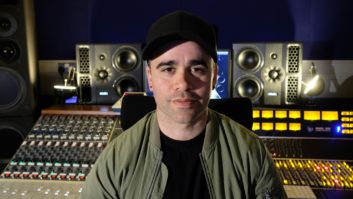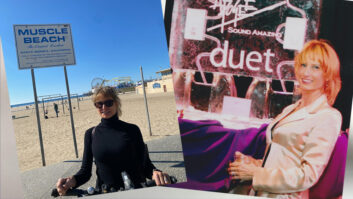Jimmie Johnson and Rob Tavaglione
Earlier today, I enjoyed working on an easy and productive gig: recording a phone interview with NASCAR driver Jimmie Johnson. It was a simple “phoner” audio-only interview, done without the usual telephone-hybrid/IFB/mixing-console arrangement. Instead we used the “cellular IFB” method: both the interviewer and Jimmie spoke to each other via cell phone, while each person’s audio was captured at their location with a studio mic.

I used Sterling Audio’s “Oceanway mic,” the ST6050 large diaphragm condenser and a Sony ECM77 lavalier, recorded with a Marantz PMD661 portable digital recorder. Even though the ST6050 has a big bottom end and pronounced top boost, I placed Jimmie far enough back (about eight inches) to avoid proximity effect and slightly off-axis to encourage smooth sibilants. The resulting sound was nicely balanced, articulate, natural and perhaps complimented by the lavalier in post.
But this routine gig is not why I write for you today; it’s what Jimmie said.
Let me preface this with a little background. Jimmie is a really good race driver, quite arguably the best ever with six championship cups to his credit. He’s so good, it’s not even fathomable; if he were a producer, he’d have the most top-40 hits in a given year, six times over! He’s like Pharrell, Babyface, Brendan O’Brien, Max Martin and Dr. Luke all put together! When Mr. Johnson talks about excellence, you oughta listen up.
Jimmie said that he spends lots of time evaluating and analyzing his mistakes, often against the advice of advisers who felt he was too negative. He went on to say that he found detailed preparation invaluable, that the confidence it bred allowed him to “slow everything down” and deal with the most tense situations calmly, without a panicky blur. He added that physical training not only brought him fitness, but also mental acuity and fast decision making that further helped slow things down.
Seems to me that Jimmie is blessed with talent, but he’s also right on the money with advice that can apply to many, many disciplines. The truth therein for audio mixers (FOH, broadcast or studio) is abundant:
Create a library of all your mistakes: Remember that flabby kick drum you enabled; the snare that couldn’t cut through warm butter; that broadcast mix where your nats overwhelmed your VO? Never again! We must create an encyclopedia of our bad methodologies, failed sounds and mental failures. For that matter, create a mental list of “best practices” and employ them when trouble rears its ugly head.
Slow everything down: When the stuff hits the fan, do you freeze up and stop to think? Does solving one problem lead to another? You need to get in the zone—that place where panic doesn’t exist, where answers are easily pulled from the well and time seems to crawl. A positive attitude is essential, as is a good ol’ deep breath, but nothing slows time down like experience. Remember, you’ve been in this deep before and you’re still here today, so be confident you can fix it like a boss and you just might.
Complete your training: You barely slept a wink, your diet consists of fat/sugar/salt and your idea of recharging your batteries is your second Starbucks red-eye of the day. You’re overworked, underpaid, have the grouchiness to prove it—and you think you’re gonna be a badass audio engineer today? You’re gonna be shadow of your former self, that’s the truth of it. Eat right, sleep well, exercise, do mental exercises, learn new things and get your act together! Anybody can work, but true professionals prepare for the most intense work, do their homework and train their mind-body combination into tip-top shape—anything less is a half-hearted attempt and likely doomed to failure.
Don’t you get mad at me, as I’m preaching to myself and the choir, too (we could all use an occasional reminder)! I was fortunate to hear Jimmie’s words and found inspiration from a man who can be called a “champion’s champion.” Thank you sir, as your sharing will serve to remind us all what true achievement and its neverending pursuit entails.
And now, if you’ll excuse me, I’m of to work at my craft until I’m considerably better at it.







